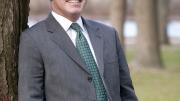When Joseph Aldy trekked up Mount Kilimanjaro with his father in 2000, he was a long way from the farm in Kentucky where he grew up—but close to the things that matter to him. Aldy is an economist who works on energy and climate-change policy. He loves to hike. On Kilimanjaro’s 19,341-foot peak, he got to see the last vestiges of the 11,000-year-old glaciers there—they are expected to disappear within the next decade or so. An assistant professor of public policy at Harvard Kennedy School (HKS), he is faculty chair of the regulatory-policy program at its Mossavar-Rahmani Center for Business and Government. He got his start in environmental economics in Washington, D.C., where he became jet-lagged working on the Kyoto Protocol in 1997, even though he didn’t go to Japan: he was the economist who stayed home and crunched U.S. emissions numbers from 7:30 p.m. to 6:30 a.m. for the Council of Economic Advisers (CEA). In the Clinton administration, he rose from a presidential management internship to posts as staff economist, and then senior economist for the environment and natural resources, for the CEA. After earning a Ph.D. from Harvard in 2005, he returned to government service under President Obama as special assistant to the president for energy and environment, deferring his appointment at HKS to work on the clean-energy package of the American Recovery and Reinvestment Act, among other initiatives. “The political world can get hung up on trivial things,” he says, but experience gained by “working in Washington can help you understand what really is a relevant policy question. Scholarship needs to be informative.”
Joseph Aldy studies and devises climate change policy and energy policy
Joseph Aldy studies and devises climate change policy and energy policy
Profile of a scholar and adviser to presidents on energy policy and climate change policy

You might also like
Former Homeland Security Chief Says ICE and CBP Have “Lost Their Way”
At Kennedy School talk, Jeh Johnson advocates restructuring “outdated” DHS.
Open Book: A New Nuclear Age
Harvard historian Serhii Plokhy’s latest book looks at the rising danger of a new arms race.
Harvard Symposium Tackles 400 Years of Homelessness in America
Professors explore the history of homelessness in the U.S., from colonial poor laws to today’s housing crisis
Most popular
Explore More From Current Issue

How a Harvard Hockey Legend Became a Needlepoint Artist
Joe Bertagna’s retirement project recreates figures from Boston sports history.







